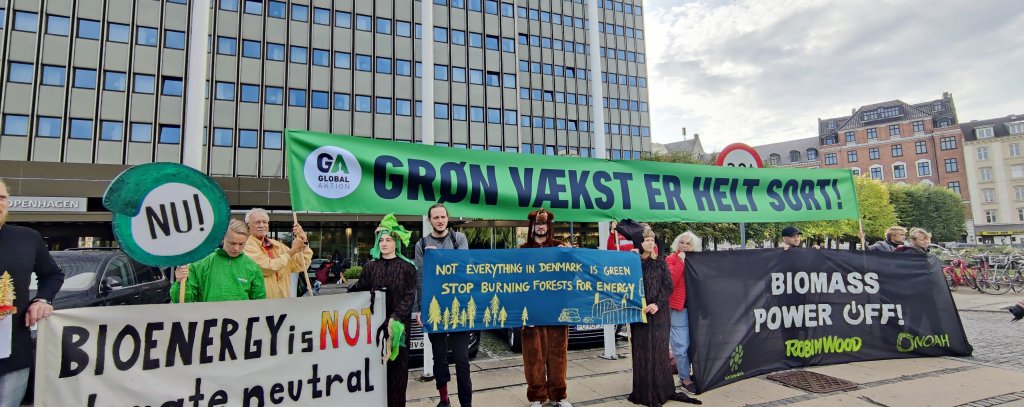
November 2021 – Since 2018, an important part of Biofuelwatch’s work has been to support biomass campaigners and activists in different European countries. We also reach out to forest, energy and climate campaigners from NGOs and grassroots organisations across Europe to help raise awareness of the urgent need to protect the climate, biodiversity and public health by stopping renewable energy subsidies from going towards the burning of wood from forests.
Wood-bioenergy in Europe – background:
Around 37% of the EU’s total energy classed as renewable comes from burning forests wood; for bioenergy overall (including liquid biofuels and biogas), the figure is 60%. The EU plans to increase its 2030 renewable energy from 20% in 2020 to 40% by 2030. Expanding the share of low-carbon renewable renewable energy is a vital part of addressing the climate crisis, however, burning wood – most of it taken directly from forests – for energy is far from low-carbon. Despite a strong campaign from many NGOs and civil society organisations across Europe and beyond, there is a high risk that EU policy will continue to permit member states to subsidise an ever greater expansion for wood bioenergy. This is despite clear evidence that the increase in energy production from forest wood in the EU correlates with a steep increase in forest degradation across Europe: the scale and size of clearcuts has been increasing, and the volume of trees/wood in forests has been declining. This is disastrous for wildlife and plant diversity as well as for the climate. Moreover, European countries are increasingly also importing wood pellets from outside the EU, especially from the USA, Canada, Russia.
Despite the harmful EU policy on biomass energy, EU member states are free to make their own decisions as to whether to subsidise energy from wood, or focus support on wind, solar, wave and tidal power coupled with energy conservation instead.
Over the past year, our work has included:
- Coordinating a subgroup for European campaigners as part of an International Biomass Working group hosted by the Environmental Paper Network;
- Researching and maintaining a database of European biomass power and heat plants above a minimum capacity of 20 megawatt – this feeds into a global biomass mapping project by the Environmental Paper Network;
- Active participation in the Environmental Paper Networks Biomass Finance Group, with a special focus on divestment campaigning that supports wider campaigns against existing and planned biomass developments in Europe;
- Supporting NGOs and grassroots campaign groups with resources, information and advice relevant to wood bioenergy developments and related policies: Examples of such support include: a) compiling and summarising scientific articles and letters by scientists, b) analysing Environmental Impact Assessments, c) putting campaigners in contact with individuals and organisations with relevant campaign experiences or specialist technical or legal knowedge;
- Presenting at and helping to organise online information and discussion events;
- Providing active campaign support, such as drafting joint Open Letters, press releases or social media action alerts.
Since 2020, Biofuelwatch has taken a particularly active role in campaigning against biomass subsidies, coal-to-biomass conversions and new biomass heat and power plants in Germany. Germany is Europe’s largest burner of coal for energy. Coal burning in heat and power stations is being phased out all too slowly. Energy companies such as Onyx, EnBW and Vattenfall, are keen to convert at least some of those coal plants, rather than having to write off their assets and invest in entirely different, low-carbon renewable energy infrastructure. The large majority of the proposed conversions/boiler replacements are for fossil gas (also disastrous for the climate). However, several coal-to-biomass conversions are under considerations which, if they go ahead, could lead to Germany becoming a large new wood pellet importer, with serious negative consequences for forests, climate and communities. Furthermore Germany has a significant number of medium-size dedicated biomass plant, and plans for additional ones continue to be announced. Biofuelwatch is working closely with German NGOs, especially Robin Wood, German Environmental Action (Deutsche Umwelthilfe) and BirdLife Germany (NABU) to help build a wider campaign against large-scale generation of bioenergy from wood.
